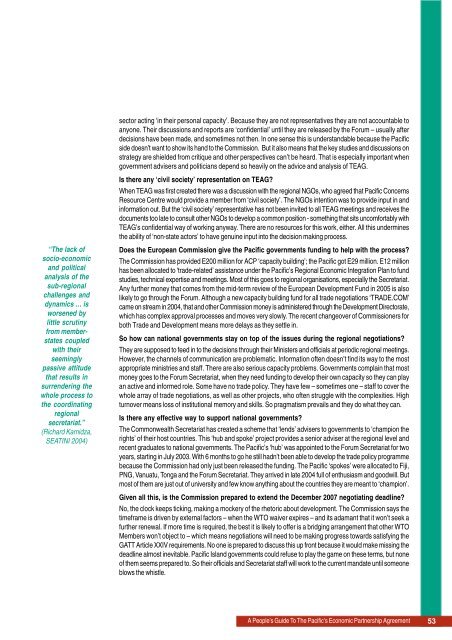REPA Booklet - Stop Epa
REPA Booklet - Stop Epa
REPA Booklet - Stop Epa
Create successful ePaper yourself
Turn your PDF publications into a flip-book with our unique Google optimized e-Paper software.
sector acting ‘in their personal capacity’. Because they are not representatives they are not accountable to<br />
anyone. Their discussions and reports are ‘confidential’ until they are released by the Forum – usually after<br />
decisions have been made, and sometimes not then. In one sense this is understandable because the Pacific<br />
side doesn’t want to show its hand to the Commission. But it also means that the key studies and discussions on<br />
strategy are shielded from critique and other perspectives can’t be heard. That is especially important when<br />
government advisers and politicians depend so heavily on the advice and analysis of TEAG.<br />
“The lack of<br />
socio-economic<br />
and political<br />
analysis of the<br />
sub-regional<br />
challenges and<br />
dynamics … is<br />
worsened by<br />
little scrutiny<br />
from memberstates<br />
coupled<br />
with their<br />
seemingly<br />
passive attitude<br />
that results in<br />
surrendering the<br />
whole process to<br />
the coordinating<br />
regional<br />
secretariat.”<br />
(Richard Kamidza,<br />
SEATINI 2004)<br />
Is there any ‘civil society’ representation on TEAG?<br />
When TEAG was first created there was a discussion with the regional NGOs, who agreed that Pacific Concerns<br />
Resource Centre would provide a member from ‘civil society’. The NGOs intention was to provide input in and<br />
information out. But the ‘civil society’ representative has not been invited to all TEAG meetings and receives the<br />
documents too late to consult other NGOs to develop a common position - something that sits uncomfortably with<br />
TEAG’s confidential way of working anyway. There are no resources for this work, either. All this undermines<br />
the ability of ‘non-state actors’ to have genuine input into the decision making process.<br />
Does the European Commission give the Pacific governments funding to help with the process?<br />
The Commission has provided E200 million for ACP ‘capacity building’; the Pacific got E29 million. E12 million<br />
has been allocated to ‘trade-related’ assistance under the Pacific’s Regional Economic Integration Plan to fund<br />
studies, technical expertise and meetings. Most of this goes to regional organisations, especially the Secretariat.<br />
Any further money that comes from the mid-term review of the European Development Fund in 2005 is also<br />
likely to go through the Forum. Although a new capacity building fund for all trade negotiations ‘TRADE.COM’<br />
came on stream in 2004, that and other Commission money is administered through the Development Directorate,<br />
which has complex approval processes and moves very slowly. The recent changeover of Commissioners for<br />
both Trade and Development means more delays as they settle in.<br />
So how can national governments stay on top of the issues during the regional negotiations?<br />
They are supposed to feed in to the decisions through their Ministers and officials at periodic regional meetings.<br />
However, the channels of communication are problematic. Information often doesn’t find its way to the most<br />
appropriate ministries and staff. There are also serious capacity problems. Governments complain that most<br />
money goes to the Forum Secretariat, when they need funding to develop their own capacity so they can play<br />
an active and informed role. Some have no trade policy. They have few – sometimes one – staff to cover the<br />
whole array of trade negotiations, as well as other projects, who often struggle with the complexities. High<br />
turnover means loss of institutional memory and skills. So pragmatism prevails and they do what they can.<br />
Is there any effective way to support national governments?<br />
The Commonwealth Secretariat has created a scheme that ‘lends’ advisers to governments to ‘champion the<br />
rights’ of their host countries. This ‘hub and spoke’ project provides a senior adviser at the regional level and<br />
recent graduates to national governments. The Pacific’s ‘hub’ was appointed to the Forum Secretariat for two<br />
years, starting in July 2003. With 6 months to go he still hadn’t been able to develop the trade policy programme<br />
because the Commission had only just been released the funding. The Pacific ‘spokes’ were allocated to Fiji,<br />
PNG, Vanuatu, Tonga and the Forum Secretariat. They arrived in late 2004 full of enthusiasm and goodwill. But<br />
most of them are just out of university and few know anything about the countries they are meant to ‘champion’.<br />
Given all this, is the Commission prepared to extend the December 2007 negotiating deadline?<br />
No, the clock keeps ticking, making a mockery of the rhetoric about development. The Commission says the<br />
timeframe is driven by external factors – when the WTO waiver expires – and its adamant that it won’t seek a<br />
further renewal. If more time is required, the best it is likely to offer is a bridging arrangement that other WTO<br />
Members won’t object to – which means negotiations will need to be making progress towards satisfying the<br />
GATT Article XXIV requirements. No one is prepared to discuss this up front because it would make missing the<br />
deadline almost inevitable. Pacific Island governments could refuse to play the game on these terms, but none<br />
of them seems prepared to. So their officials and Secretariat staff will work to the current mandate until someone<br />
blows the whistle.<br />
A People’s Guide To The Pacific’s Economic Partnership Agreement 53
















